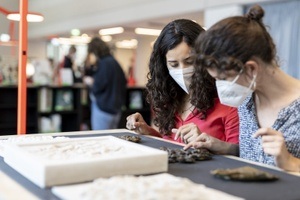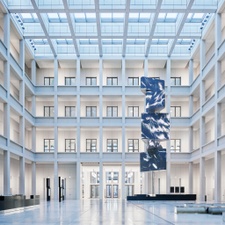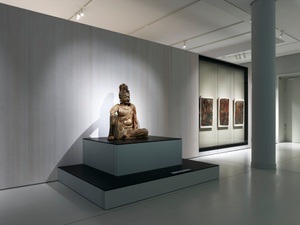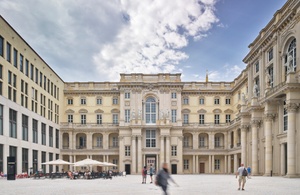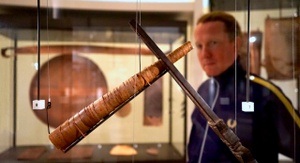Fachtagung: Trauma – Erinnerung – Mahnung. Sexuelle Gewalt in kriegerischen Konflikten
In the organizer's words:
Sexual violence in armed conflicts is a global phenomenon. It has devastating consequences for victims and survivors, causes trauma, destroys families and damages social structures over generations. In long-standing conflicts, sexual violence was hardly documented or was strongly marginalized. Such acts are now punishable under international law. And yet for most survivors, their voices are not heard enough.
The aim of the conference is to take stock of the current state of interdisciplinary research. Renowned international academics will address the topic from different geographical, regional and temporal perspectives and ask how sexual violence in wars is located in different cultures of remembrance.
PROGRAMME
9.15 - 9.30 a.m.
Welcome
Dr. Christin Pschichholz, Documentation Centre Flight, Expulsion, Reconciliation
9.30 - 11.00 a.m.
Panel 1: Sexual violence in armed conflicts: Forms, explanations and visualization
Chair: Dr. Claudia Kemper, LWL Institute for Westphalian Regional History Münster
PD Dr. Regina Mühlhäuser, Hamburg Institute for Social Research:
Military, Body, Politics. Sexual violence in armed conflicts and rape as a weapon of war
Prof. em. Dr. Rolf Pohl, Gottfried Wilhelm-Leibniz-Universität Hannover:
Sexual violence in civilian life and in war. On gender, sexism and destructive sexuality in male-dominated societies
Helen Upcraft, Imperial War Museum, London:
Unsilenced: An Exhibition about Sexual Violence
Talk
11.00 - 11.15 a.m.
Break
11.15-12.45
Panel 2: When are survivors allowed to speak? Perspectives in the context of the Second World War
Chair: Prof. Dr. Sebastian Conrad, Free University of Berlin
Dr. Sachiyo Tsukamoto, University of Newcastle (AUS):
The Politics of Trauma and Integrity. Stories of Japanese "Comfort Women"
Dr. Insa Eschebach, Free University of Berlin:
Forms of sexual violence in the Second World War: Wehrmacht, SS, Red Army
Prof. Dr. Maren Röger, Leibniz Institute for the History and Culture of Eastern Europe (GWZO)/University of Leipzig:
Speaking out loud, eloquent silence: On wartime sexual violence by the Red Army and the comparative approach after 1945
Discussion
12.45 - 14.30
Lunch break
14.30 - 16.00
Panel 3: Rwanda and Bosnia: The long shadows of violence
Chair: Dr. Sabine Rutar, Leibniz Institute for East and Southeast European Studies, Regensburg
Dr. Jennie E. Burnet, Georgia State University, USA:
From Solidarity to Abandonment: How International Activism Tokenized Rwandan Genocide Sexual Violence Survivors
Dr. Monika Hauser, medica mondiale e.V.:
Weapon of war or patriarchal continuum? Dimensions of sexualized war violence - medica mondiale's experience since Bosnia and Herzegovina
Prof. Dr. Heide Glaesmer, University of Leipzig:
Children of war - concealed origins and intergenerational consequences
Discussion
16.00 - 16.15
Break
Panel 4: Current conflicts and new dimensions of sexualized violence
Chair: Dr. Alex Kay, University of Potsdam
Prof. Dr. Ruth Halperin-Kaddari, Bar-Ilan University, Ramat Gan:
Accountability for Conflict Related Sexual Violence: October 7 as a Case-Study
Dr. Alexander Schwarz, European Center for Constitutional and Human Rights e.V.:
Gender-based violence against Yazidi women and the role of international criminal justice
Dr. Sabine Fischer, Stiftung Wissenschaft und Politik, Berlin:
Russia's war in Ukraine: Sexual violence against men and women
Discussion
17.45 - 18.00
Break
18.00 - 19.30
Panel discussion
The concluding panel discussion will ask how sexual violence in armed conflicts can be incorporated into historical awareness and remembrance work. What role can visual forms of remembrance play in this? And what is necessary in order to understand the topic not as a "women's issue", but as a challenge for society and security policy as a whole?
Panel guests:
Reem Alabali-Radovan, Federal Minister for Economic Cooperation and Development (requested)
Serap Güler, State Secretary at the Federal Foreign Office
Düzen Tekkal, HÁWAR help e.V.
Maria Werthan, Honorary President of the Women's Association of the Federation of Expellees e.V.
Moderation: Prof. Dr. Kerstin von Lingen, University of Vienna
FURTHER INFORMATION
Admission time: 09.00 a.m.
Language: Conference languages are German and English. Simultaneous translation will be provided.
FREE ADMISSION
- Opening evening
November 4, 6:00 - 9:00 p.m. - Workshop: Genocide against the Yazidis - remembering and documenting
November 6, 10.00 - 12.00 a.m. - Workshop: Painterly expression of inner experiences. Biographical workshop
November 6, 10.00 a.m. - 12.00 p.m.
The event takes place in cooperation with the Frauenverband im Bund der Vertriebenen e.V. and HÁWAR help e.V.
Funded by the Federal Government Commissioner for Culture and the Media, the Senate of Berlin and the District of Mitte.
This content has been machine translated.




